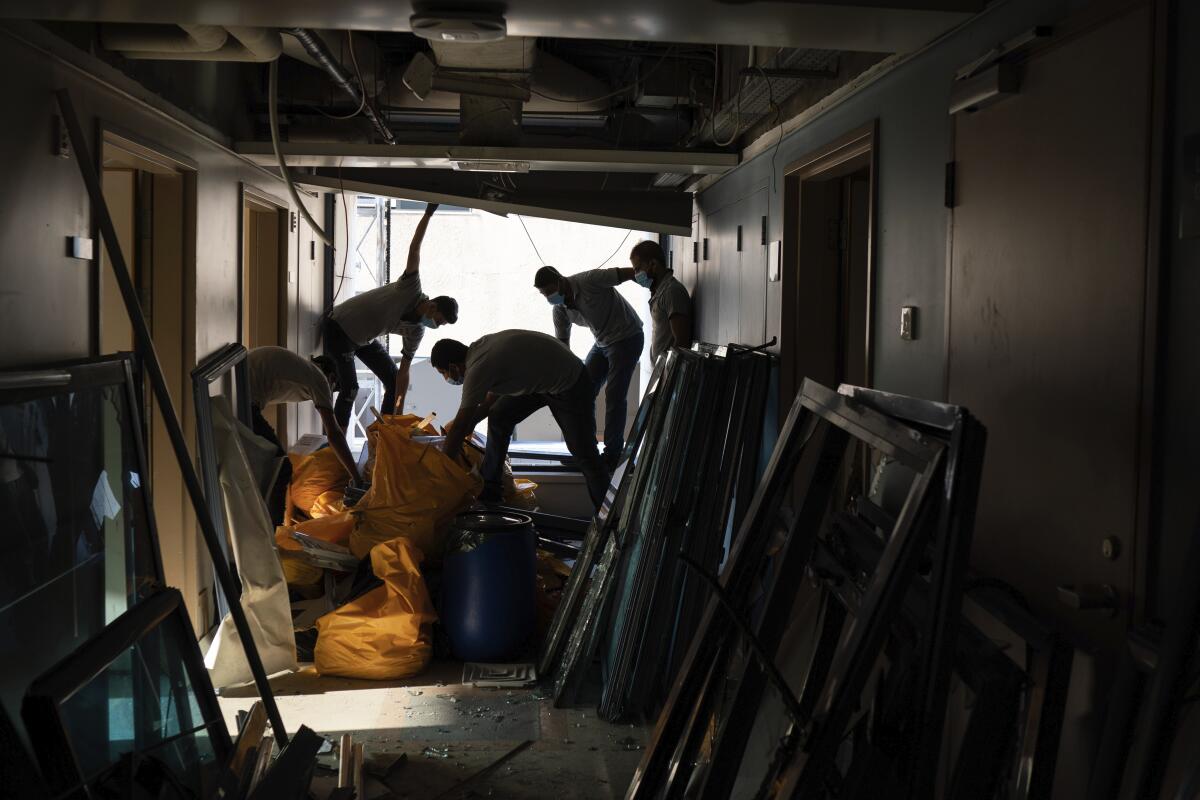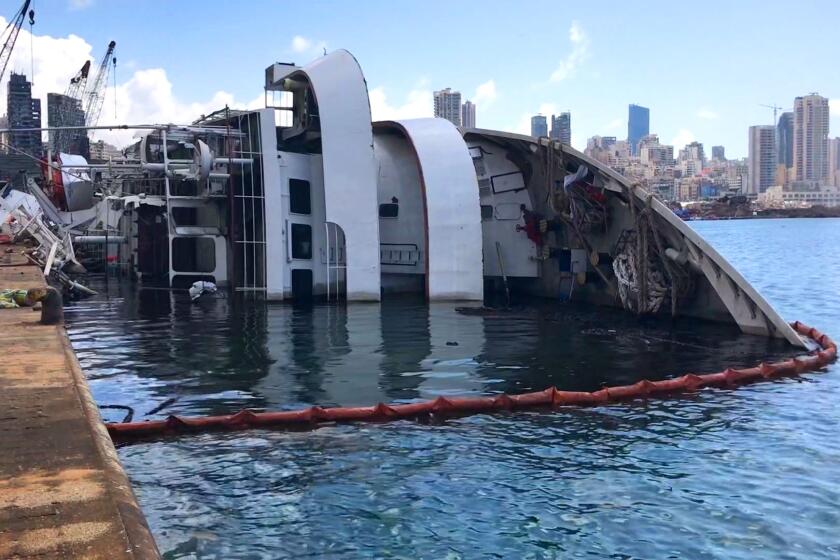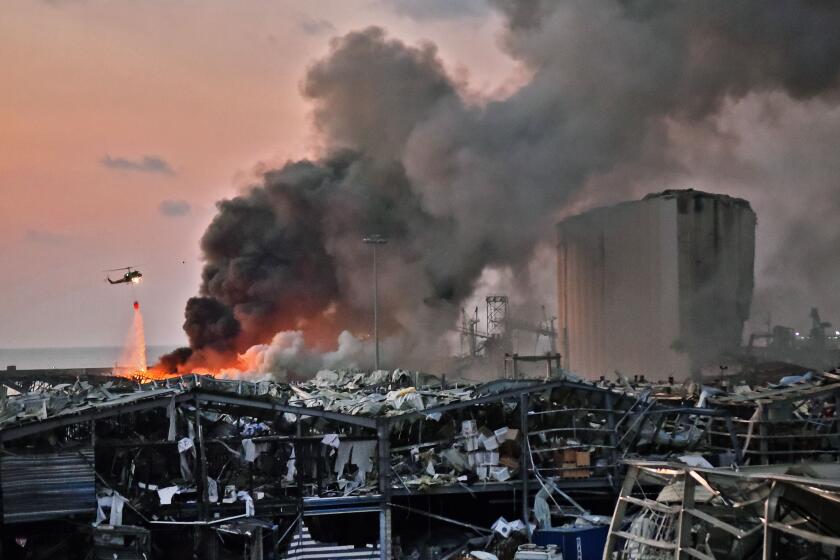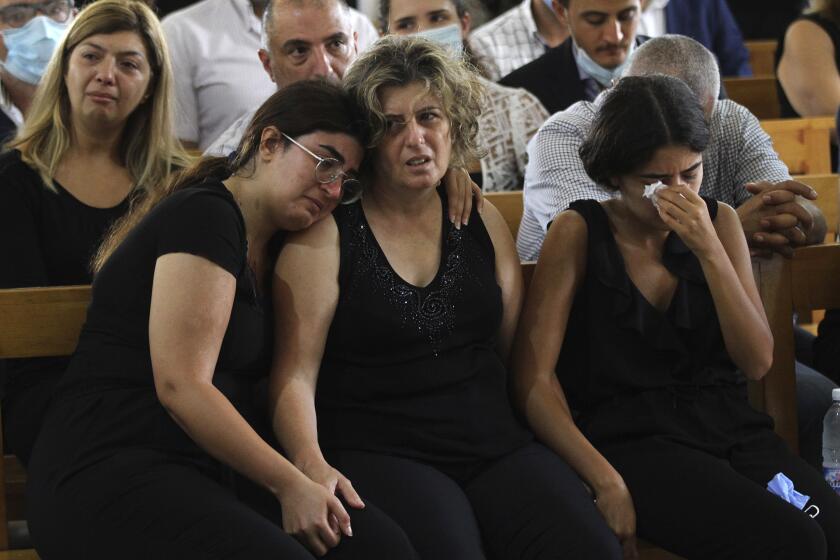FBI to join investigation of Beirut blast as Lebanon’s military is given sweeping powers

- Share via
BEIRUT — The FBI will join Lebanese and other international investigators in the investigation into the Beirut port blast that killed and wounded thousands, a visiting U.S. diplomat said Thursday.
Under Secretary for Political Affairs David Hale said during a tour of a Beirut neighborhood affected by the explosion that the FBI would be taking part at the invitation of Lebanese authorities. Hale is expected to hold further meetings with Lebanese officials over the next two days.
News of U.S. involvement in the investigation came as Lebanon’s parliament on Thursday approved a state of emergency in Beirut in its first session since the catastrophic Aug. 4 explosion, granting the military sweeping powers amid rising popular anger at official corruption and mismanagement and political uncertainty.
The government of Prime Minister Hassan Diab resigned en masse Monday, less than a week after the blast that killed more than 170 people, injured at least 6,000, wrecked Beirut’s port and caused widespread damage across the capital.
The disaster has boosted popular fury with Lebanon’s leaders to a new level as the country reels from an unprecedented economic and financial crisis, along with the COVID-19 pandemic.
Before it resigned, the government declared the state of emergency that gave the military the power to declare curfews, prevent public gatherings and censor the media, as well as refer civilians to military tribunals for alleged security breaches. The action required ratification by lawmakers, who granted it Thursday.
Restoring historic districts badly damaged in the Beirut blast will be a tall order given Lebanon’s weak economy and developers’ eagerness to move in.
The move has been criticized by rights groups and others who say the civilian government already has been operating with increased powers because of the coronavirus outbreak. Some point to the military crackdown on protesters last week, fearing the extended powers could lead to the silencing of dissent.
Parliament met outside its regular location to observe social distancing amid a surge of coronavirus cases and because of nearby ongoing protests by those who want the entire political class to step down.
The session opened with a moment of silence for those killed in the blast. Members then moved to discuss the resignation of nearly a dozen lawmakers last week to protest the government’s handling of the event. A major Christian party bloc is boycotting the parliamentary session. The Cabinet is acting in a caretaker capacity.
It still was not known what caused the fire that ignited nearly 3,000 tons of ammonium nitrate stored for years in Beirut’s port. But documents have emerged that show the country’s top leadership and security officials were aware of the stockpile.
Los Angeles Times reporter Nabih Bulos was less than 500 yards from the center of the massive explosion in Beirut. He lived to tell the tale
It was not immediately clear if parliament had technically extended the government decision on the state of emergency for 15 days or simply imposed it to take effect starting Thursday, said rights lawyer Nizar Saghieh.
“There is incredible chaos,” Saghieh said. He said the state of emergency’s goal appeared to be to extend the power of the state and security agencies and “control the opposition.”
“We were waiting for the army to help in reconstruction,” he said, “not be an extension of power.”
Lawmaker Simon Abi Ramieh protested that parliament was convened to vote on the state of emergency while it was already in effect and called instead for forming a parliamentary committee to investigate the explosion.
Through tears in Beirut, Lebanese survivors share stories of missing loved ones
“We are living in a state of institutional blunder,” he said. “We are in a place and the Lebanese people are somewhere else. ... The public wants to know the truth behind the negligence that led to the explosion.”
Lebanon’s political landscape has been shaken by the events. Before resigning, Diab proposed early elections, an idea that was not supported by the parliament speaker or other political groups.
Since the collective resignation of ministers, there has been a flurry of closed-door meetings and political haggling to form a government that meets the approval of domestic and international powers. Lebanon’s complicated sectarian-based political system requires the prime minister to be chosen from among Sunni Muslims.
It wasn’t clear if there would be a national unity government — which would mean the participation of all political parties — or an emergency transition government.
France’s defense minister was due to arrive in Beirut on Thursday, following in the footsteps of French President Emmanuel Macron, who visited soon after the blast and was greeted with extraordinary appeals for help from Beirutis fed up with their own leaders. France, which once oversaw Lebanon as a protectorate, has been leading efforts to help the country recover from the drastic blow, including talking to political parties to hasten the formation of a new government.
More to Read
Sign up for Essential California
The most important California stories and recommendations in your inbox every morning.
You may occasionally receive promotional content from the Los Angeles Times.













